#Luis Cárdenas López
Explore tagged Tumblr posts
Text
'El Show: Crónica de un Asesinato', Investigación a Profundidad
Ya estamos a menos de una semana de que se estrene la serie sobre el caso Stanley, uno de los asesinatos más importantes en la historia de este país, pero antes de esta serie ficticia, existió una serie documental hablando del mismo caso, acompáñanos a descubrir todo sobre esta serie que puede sorprender a más de uno. Reseña | ‘El Show: Crónica de un Asesinato’ Si se quiere hablar de grandes…

View On WordPress
#Alfredo Adame#Andrés Manuel López Obrador#Benito Castro#Brenda Bezares#Crónica de un Asesinato#Cuauhtémoc Cárdenas#Diego Enrique Osorno#El Show#El Show: Crónica de un Asesinato#Emilio Azcárraga Jean#Espectáculos#Farándula#Jorge Gil#Luis de Alba#Mario Bezares#Paco Stanley#Paola Durante#Ricardo Salinas Pliego#Televisa#TV Azteca#Univisión#Vix+
0 notes
Text
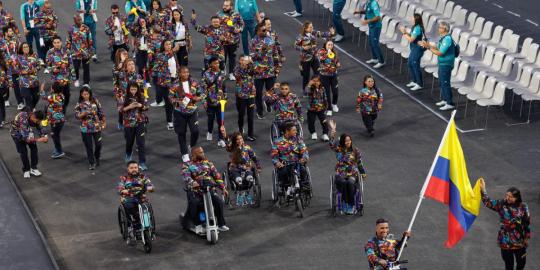

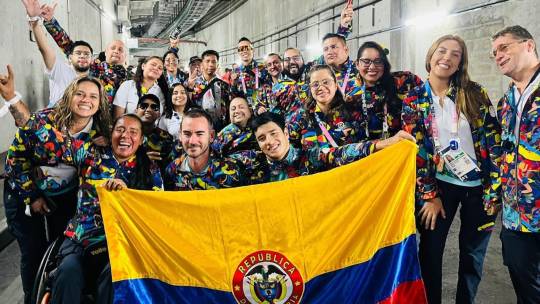

A bit late but couldn't forget about them, our Paralympics delegation. They absolutely killed it. Every single one of them giving it all and making us proud.
Thank you to all of our 78 participants, 28 medalists, and 44 diplomas.
Alex Enrique Martínez Guevara, Ana Lucía Pinto Ochoa, Andrés Felipe Mosquera Neira, Angie Lizeth Pabón Mamian, Aura Cristina Poblador Granados, Bertha Cecilia Fernández Arango, Brayan Mauricio Triana Herrera, Buinder Brainer Bermúdez Villar, Carlos Andrés Vargas Villanueva, Carlos Daniel Serrano Zárate, Daniel Giraldo Correa, Daniela Carolina Munévar Flórez, Darian Faisury Jiménez Sánchez, David Felipe Rendón Acosta, Diego Fernando Meneses Medina, Edilson Chica Chica, Edwin Fabián Matiz Ruiz, Eglain Antonio Mena Lemus, Erica María Castaño Salazar, Euclides Grisales Diaz, Fabio Torres Silva, Francy Esther Osorio Calderón, Fredy Duvian López Morales, Gabriela Oviedo Rueda, Giovanny Andrés Malambo Rachez, Gisell Natalia Prada Pachón, Héctor Julio Ramírez Murcia, Ionis Dayana salcedo rodríguez, Jesús Alberto López, Jesús Augusto Romero Montoya, Jhohan Darío Ardila Cárdenas, Jhon Alexander Hernández García, Jhon Eider González Hernández, Jhon Fredy Gómez Giraldo, Jhon Sebastián Obando Asprilla, José Gregorio Lemos Rivas, Juan Alejandro Campas Sánchez, Juan David Pérez Quintero, Juan Esteban García Sánchez, Juan Esteban Patiño Giraldo, Juan José Betancourt Quiroga, Julián Andrés Jaramillo Téllez, Karen Tatiana Palomeque Moreno, Kevin Alfonso Moreno Gualaco, Laura Carolina González Rodríguez, Leider Albeiro Lemus Rojas, Leidy Johanna Chica Chica, Lino Nicolás Coca Castro, Luis dahir Arizala Ocoró, Luis Fernando Lara Rodallega, Luis Fernando Lucumí Villegas, Luis Francisco Sanclemente, María Alejandra Murillo Benítez, María Angélica Bernal Villalobos, María Mónica Daza Guzmán, María Paula Barrera Zapata, María Salomé Henao Sánchez, María Teresa Restrepo Rojas, Mariana Guerrero Martínez, Mauricio Andrés Valencia Campo, Mayerli Buitrago Ariza, Miguel Ángel Rincón Narváez, Nelson Crispín Corzo, Niver Rangel palmera, Paula Andrea Ossa Veloza, Reynel Romero Montoya, Santiago Solis Torres, Sara del Pilar Vargas Blanco, William Jair higuera Ocampo, Xiomara Saldarriaga Hernández, Yamil David Acosta Manjarrez, Yasiris Blandón Escobar, Yeferson Suárez Cardona, Yeniffer Paredes Muriel, Yesenia María Restrepo Muñoz, Yesica Paola Muñoz Nieto, Zharith Alejandra Rodríguez Silva, Zuleiny Rodríguez Trujillo
#paralympics 2024#colombia#comité paralímpico colombiano#colombian paralympic committee#(nightmade)#this was my first time actually watching the paralympics games#it was amazing#I'm saddened that they don't get as much noise as the other games#like we won 9 times more medals and yet the news nothing
3 notes
·
View notes
Text
Antología de poesía contemporánea. Compilación - 105 autores (2006-2023)
Descarga desde Telegram
Descarga desde Google Drive

Apps requeridas para acceder: Telegram o Google Drive, y "Lithium: lector ePub". Todos los archivos disponibles en formato (EPUB) en Herederos del Kaos (canal telegram).
©Autores: Daniel Frini, Alberto Jiménez Ure, Nieves Jurado, Milton Ordóñez, Shabely Botello, Wafi Salih, Pablo López, Roberto Garcés Marrero, Leopoldo Reinhard Resch, José Alberto Capaverde, Francisco J. Barata Bausach, Susana Medina, Adrián "fino" Sosa, David Crauley, Jordi Tauler Vaillet, José Luis Regojo, Federico Ambesi, Juan Benítez, Alex Armega, Sebastián Trujillo,, Gabriel Valdovinos Vázquez, Juan Luis Henares, Miguel Ángel Acquesta, Juan Carlos Vásquez, Ludim Cervantes, Rita Morrigan, Carlos Almira Picazo, J.R. Spinoza, Moisés Cárdenas, Jacqueline Campos, Mario Flores, Eduardo Omar Honey, Claude Nogueras, Alberto Quero, Pilar Rezzano, Mirza Patricia Mendoza, Caroline Cruz, Alberto Juárez Vivas, Rodrigo Miguel Quintero, Montserrat López Alsina, Luna del Castillo, Guillermo Martínez, Víctor C. Drax, Lucía Scosceria de Cañellas, Everardo Gómez, Edinson Martínez, Mario Andrés Arcos, Rolando Revagliatti, Sebastián Abdala, Alina Kummerfeldt, Magdalena Páez Amador.
©Antología de narrativa contemporánea es una publicación sin fines de lucro. Su distribución a través de terceros es completamente libre, siempre y cuando no se haga un uso comercial del libro y se citen correctamente sus fuentes."
***
#cultura#literatura#herederos del kaos#poesías#poesía#antología#antología de poesía#poetas#escritores#libros digitales#librosepub#libros gratis#epub#compilación de poesía#selección de poesía
4 notes
·
View notes
Text
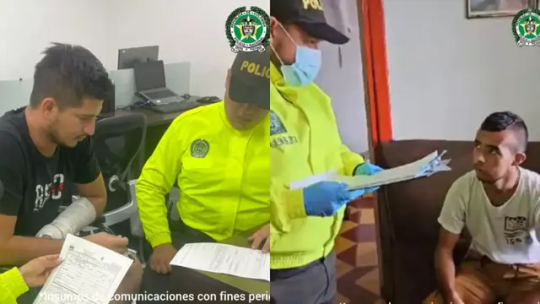
🇨🇴#COLOMBIA🇨🇴
CÁRCEL PARA DOS DISIDENTES DE LAS FARC POR CRIMEN DE UN FUNERARIO Y SU FAMILIA EN EL CATATUMBO.
Fecha 12/02/25
La Fiscalía imputó a dos disidentes de las FARC y fueron enviados a la cárcel por el asesinato de una pareja y su bebé de seis meses, una masacre ocurrida el 15 de enero en la región del Catatumbo, donde la violencia guerrillera ha dejado al menos 47 muertos y 50.000 desplazados, informó este martes el ente acusador.
A Brandon Cárdenas Sanguino y Luis Felipe Taborda Delgado, la Fiscalía les imputó los delitos de homicidio agravado, concierto para delinquir agravado y fabricación, porte o tenencia de armas de fuego.
Los cargos no fueron aceptados por los hombres que supuestamente pertenecen al frente 33 de las disidencias de las FARC.
Miguel Ángel López, dueño de una funeraria; su esposa, Zulay Durán, y su hijo de 6 meses fueron asesinados a tiros cuando viajaban por la carretera que une a Tibú con Cúcuta, capital de Norte de Santander.
La información de la Fiscalía detalló que Cárdenas, cabecilla del frente 33 de las disidencias de las FARC, recibió la «orden de ejecutar la acción criminal, por lo que al parecer ubicó a los sicarios y dispuso las actividades logísticas y de vigilancia».
Taborda está involucrado en los seguimientos al dueño de la funeraria para definir el lugar y el momento en que se realizaría el ataque armado.
Estos dos hombres también serían los articuladores del cobro de extorsiones, hurtos de vehículos e infraestructura petrolera, tráfico de estupefacientes, atentados contra la fuerza pública y otras conductas delictivas en la región del Catatumbo.
Via News del Sector Funerario Mundial
Fuente ⛲️
https://emisoraatlantico.com.co/nacionales/carcel-para-dos-disidentes-de-las-farc-por-crimen-de-funerario-y-su-familia-en-el-catatumbo/
0 notes
Text

OJALÁ QUE ASÍ SIGAN
Monterrey, Nuevo León., sábado 4 de Enero de 2025.-Bravos termina invicto la pretemporada rumbo al Clausura 2025
Los Bravos de Juárez empataron 2-2 frente a Tigres la mañana de este sábado en un partido amistoso y de preparación que se desarrolló en el Estadio Universitario de Monterrey, Nuevo León.
Con este resultado el Equipo de la Frontera terminó invicto su pretemporada luego de enfrentar a tres rivales en 5 partidos, en 3 salió victorioso (Cancún FC en dos ocasiones y Venados FC) y en 2 empató (Cancún FC y Tigres). En acciones de este último partido, Guilherme Castilho abrió el marcador al minuto 3 con un disparo de fuera del área hacia el palo derecho de Nahuel Guzmán.
Diego Lainez empató el encuentro al minuto 10. Pero Bravos respondió rápidamente.
Al minuto 19 Óscar Estupiñán puso el 1-2 luego de un gran centro de José Luis ‘Puma’ Rodríguez por la banda izquierda, el atacante colombiano de los Bravos remató de cabeza dentro del área chica para vencer el arco rival.
Ya en el segundo tiempo, el árbitro central señaló un penal a favor de la escuadra universitaria. Al minuto 78, Nicolás Ibáñez cobró desde los once pasos, Arturo Delgado detuvo el tiro, pero el delantero del rival aprovechó el rebote y puso el 2-2.
El partido se jugó a 90 minutos en el Estadio Universitario. Sebastián Jurado no tuvo acción en este encuentro debido a una enfermedad en las vías respiratorias, mientras que Carlos Salcedo, Ralph Orquin y Diego Campillo tampoco estuvieron sobre la cancha debido a problemas musculares.
Los Bravos debutarán en el Clausura 2025 el viernes 10 de enero como visitante, frente a Mazatlán en el Estadio El Encanto. El primer partido en casa será contra Cruz Azul el 18 de enero.
XI TITULAR DE BRAVOS: Benny Díaz (P) Denzell García Moisés Mosquera José Manríquez Eder López Jonathan González Guilherme Castilho Dieter Villalpando Jairo Torres José Luis Rodríguez Oscar Estupiñán
CAMBIOS: Javier Nevarez (Denzell García) Arturo Delgado (Benny Díaz) Haret Ortega (Moisés Mosquera) Daniel Cárdenas (Eder López) César Sosa (Guilherme Castilho) Karel Campos (Dieter Villalpando) Jan Carmona (Jairo Torres) Alex Méndez (José Luis Rodríguez) Ángel Zaldívar (Óscar Estupiñán) Leo Rodríguez (Jonathan González) Daniel Fiscal (José Manríquez)
(Prensa FC Juárez)
0 notes
Text
García Luna vincula a AMLO con narcotraficantes

CIUDAD DE MÉXICO * 17 de septiembre 2024. ) Apro / Agencias Genaro García Luna, secretario de Seguridad Pública de Felipe Calderón, denunció que hay pruebas de la colusión entre el presidente Andrés Manuel López Obrador y narcotraficantes. “Es del conocimiento público y está en los registros oficiales de México y de EUA los contactos, videos, audios, fotografías, registro de comunicación y gestión entre el actual presidente de México, López Obrador, y sus operadores, con los líderes del narcotráfico y sus familias, en particular con los narcotraficantes que fueron utilizados como testigos en mi contra durante el juicio, quienes incluso durante el juicio imputaron al presidente López Obrador y a sus operadores de estar vinculados con ellos y el narcotráfico”, dice García Luna. El exsecretario de Seguridad, preso en Nueva York, afirmó lo anterior en una carta que le

hizo llegar al periodista Keegan Hamilton, quien la difundió en su cuenta de X. “Estos hechos están corroborados con la reciente captura del narcotraficante Ismael 'Mayo' Zambada, la carta emitida por él donde señala los vínculos del actual gobierno con él y el narcotráfico, la posición del gobierno de México contra la captura del capo y el desmantelamiento del Poder Judicial de México (jueces, magistrados, ministros, Corte), cuyos principales beneficiarios son los criminales”, añade el exfuncionario. En la misiva, el exsecretario de Seguridad también denuncia que el gobierno de México aportó “información falsa” en su contra para el juicio en el que fue condenado. También acusó que los fiscales estadunidenses “no corroboraron la existencia y veracidad de un solo dato o información aportada por ello, aun con la evidencia presentada por la defensa que acredita que es falsa”. En la misiva, el calderonista asegura que rechazó un acuerdo posterior al arresto que le habría dado sólo seis meses de prisión. “A partir del arresto y durante los primeros días reiteradamente me ofrecieron un acuerdo con la Fiscalía de Nueva York, para que me inculpara con delitos vinculados al narcotráfico, a cambio de estar detenido poco tiempo (6 meses) y recibir beneficios económicos, de esta forma convertirme en testigo, de acuerdo a la inducción del gobierno de México. No para imputar delincuentes-narcotraficantes”. El ex titular de la Secretaría de Seguridad Pública está acusado de recibir sobornos millonarios del Cártel de Sinaloa, junto a Luis Cárdenas Palomino y Ramón Pequeño García, exfuncionarios de las Fuerzas Armadas, ellos tienen cargos por conspiración para el tráfico de cocaína. De acuerdo a la DEA, García Luna no sólo recibía dinero, él proporcionaba información confidencial al crimen organizado para sus fines. Ante, estas acusaciones, el extitular de la Policía Federal, sostuvo en su carta que él ha combatido el crimen en sus escalas más altas toda mi carrera profesional; la perspectiva era imputar personas e instituciones que en el corto plazo debilitaría el desarrollo, paz pública y vida institucional del país, dijo.
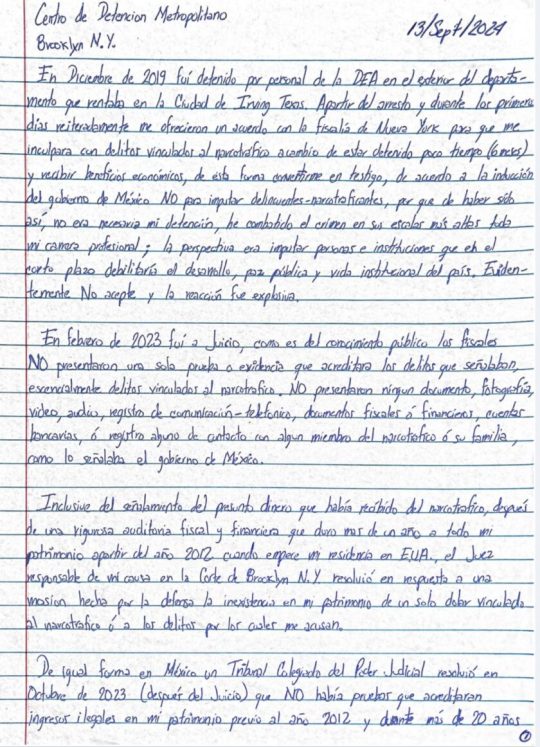
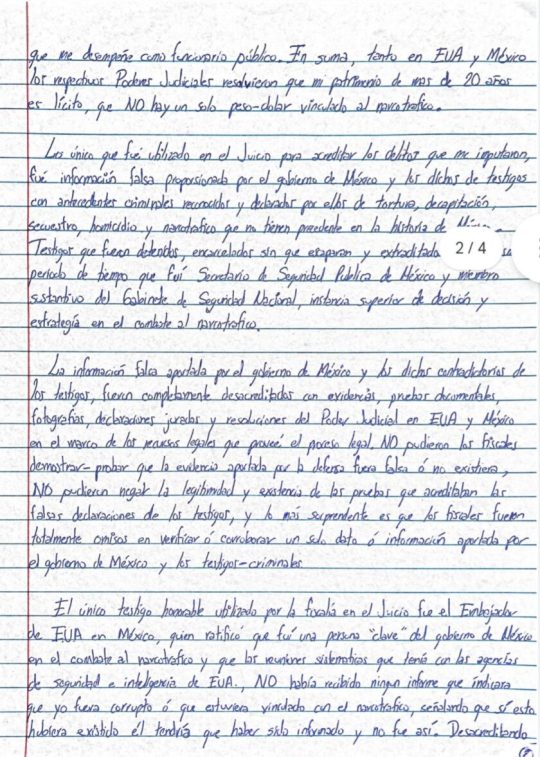
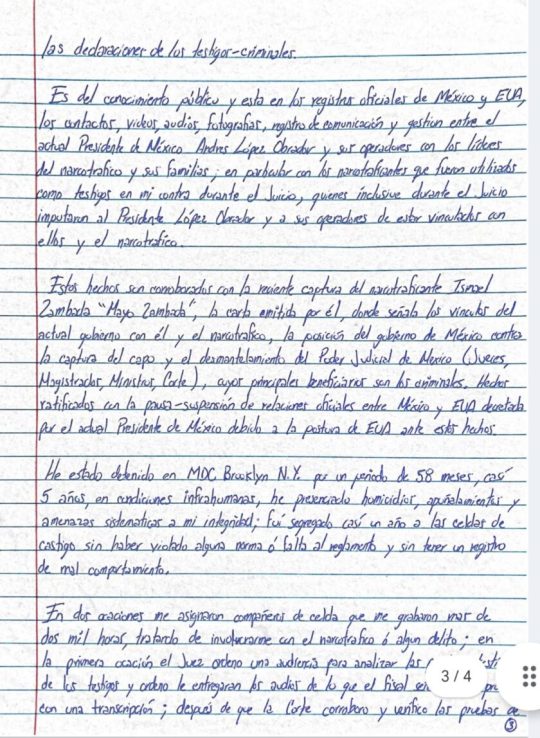
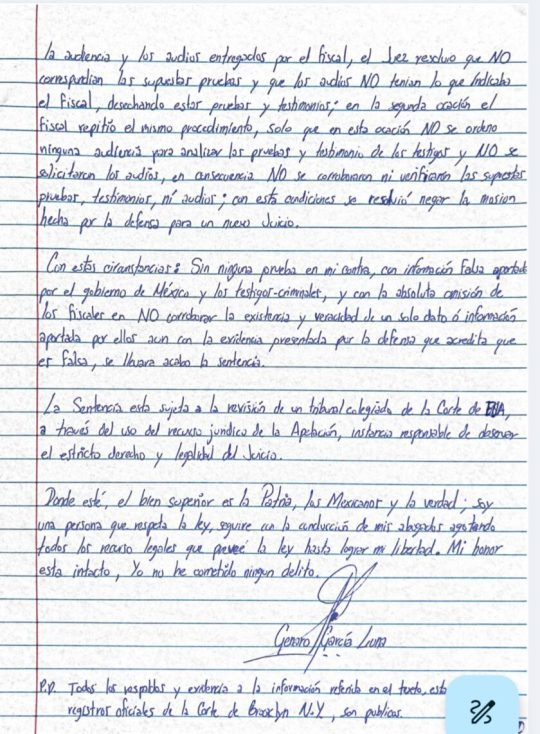
www.acapulcopress.com Read the full article
#AndrésLópezObrador#AndrésManuelLópezObrador#CarteldeSinaloa#DEA#FelipeCalderón#GenaroGarcíaLuna#Ismael'Mayo'Zambada#KeeganHamilton#LuisCárdenasPalomino#RamónPequeñoGarcía
0 notes
Text
Sheinbaum de vuelta a la ruta: la milimétrica construcción de comités
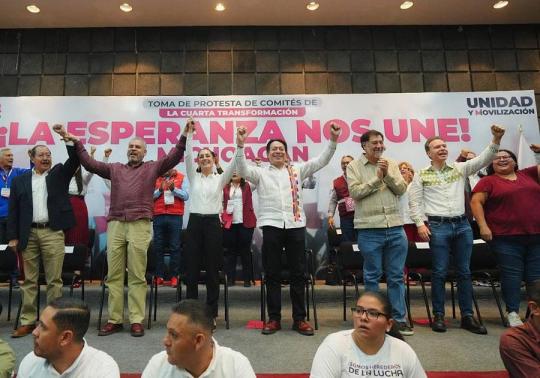
Unidad y participación en la encuesta, la recomendación de la virtual candidata a las y los aspirantes a gubernaturas Álvaro Ramírez Velasco / Enviado Morelia, Michoacán.- Veintiun días después, ahora convertida en la coordinadora nacional de los Comités de Defensa de la Cuarta Transformación (4T), Claudia Sheinbaum Pardo ha regresado a la ruta de recorridos por el país, en esta ciudad y este estado en el que los simpatizantes de los contendientes del proceso interno se dieron con todo y donde han quedado cicatrices que poco a poco comienzan a sanar. Además de la relevancia que tiene esta entidad para la izquierda — pues en estas tierras nació el expresidente Lázaro Cárdenas del Río—, el arranque de la nueva serie de giras, bautizada como "La Esperanza nos Une", finca aquí el simbolismo de la unidad en torno a la virtual candidata presidencial. En su mensaje a la militancia, en el acto masivo en el Centro de Convenciones, la unidad ha sido eje rector en el discurso de la exjefa de Gobierno. En el templete, la han acompañado su recién nombrado vocero, José Gerardo Rodolfo Fernández Noroña; el exaspirante del Partido Verde Ecologista de México (PVEM), Manuel Velasco Coello, y el senador con licencia, Ricardo Monreal Ávila, quien llegó ya comenzado el acto, pero por eso mismo se llevó una mención especial de la presidenciable y aplausos de los asistentes. El pasado 28 de agosto, todos ellos concluían los 70 días de recorridos, previo al levantamiento de encuestas; 21 días después, la respaldaron en el primer acto de toma de protesta de los comités de la Cuarta Transformación. Mensaje privado Antes del acto masivo, la esencia de las instrucciones de Claudia Sheinbaum, quien la semana pasada recibió el Bastón de Mando de manos del presidente Andrés Manuel López Obrador, fue específica y fuerte para los consejeros nacionales y estatales de Michoacán que aporta cerrada se reunieron con ella. Tras su arribo al aeropuerto, fue recibida en el Centro de Convenciones por el gobernador morenista Alfredo Ramírez Bedolla. El mandatario michoacano le presumió, a las puertas del recinto donde fue la reunión cerrada, una manta con una foto de cuando los dos pedían el apoyo para López Obrador, puerta por puerta. La gráfica, con los dos claramente con algunos años menos, data de alrededor de 2006. "Un fundador ya es gobernador. Una fundadora será presidenta", se leía en la lona que el gobernador mostró con orgullo a la virtual candidata de Morena a Palacio Nacional. Una de las preguntas clave de los reporteros locales a los personajes michoacanos fue cómo harán para solventar las afrentas y conseguir la unidad. Hace unos días, un grupo nutrido de simpatizantes del excanciller Marcelo Luis Ebrard Casaubon depuso las quejas y se sumó a Claudia. Unidad fue la esencia del mensaje privado que ella ofreció por cerca de hora y media, desde su llegada, minutos antes de las 11:00 horas, hasta las 12:30 horas, cuando comenzó la asamblea en que se firmó el Acuerdo de Unidad por la Transformación, con 27 representantes de todos los sectores. Invitación abierta Desde su llegada, Sheinbaum tuvo el acompañamiento de Mario Martín Delgado Carrillo, presidente del Comité Ejecutivo Nacional (CEN). En los discursos, fue él quien tomó la palabra, tras los mensajes de los dirigentes locales. Delgado convocó a formar parte de la 4T a quienes han estado “en esta causa desde sus orígenes”, pero también a quienes de "buena voluntad" se quieran sumar a ella. "Llamamos a la población a seguir avanzado en la regeneración de la nación, a construir un país que sea bueno y generoso para todas y todos los mexicanos. "Aquí cabemos todos: las juventudes, las mujeres, los hombres y la diversidad; todas las clases sociales, campesinos, trabajadores y trabajadoras, comerciantes, artesanos, trabajadores independientes, trabajadoras del hogar, clases medias, científicos, los artistas, pequeños, medianos y grandes empresarios; todas las religiones y libre pensadores”, dijo. Defensa de la 4T En su mensaje, Claudia Sheinbaum Pardo ponderó los logros del presidente Andrés Manuel López Obrador y convocó a defender su proyecto social. "Hoy estamos con mucha unidad para que en el 2024 una mujer de transformación encabece los destinos de la nación... "El principio de esta unidad es la unidad con el pueblo de México, nosotros no podemos fallarle al pueblo de México. El pueblo de México tomó en sus manos su destino, nosotros representamos esa voluntad del cambio verdadero, de seguir transformado a nuestro país... "El objetivo es defender los logros del presidente López Obrador y avanzar más en la Transformación, defender los nuevos derechos sociales, la pensión de adulto mayor, las becas de jóvenes, el programa Sembrando Vida, defender los programas que llegan a 30 millones de familias”, dijo. Llamado a los aspirantes Luego de terminado el acto, vinieron las peticiones, los abrazos, las selfies, que por momentos tomaba la misma Claudia con los teléfonos de los solicitantes. De prisa, entre la algarabía, una pregunta del reportero, quien le recordó que este lunes se publican las convocatorias a las nueve gubernaturas. —¿Qué llamado?—, fue la pregunta entre gritos. —Unidad y que participen en la encuesta—, fue la respuesta de ella a volumen de voz alto, con el ruido del fondo. Read the full article
0 notes
Video
vimeo
Apple Arcade - A New World To Play In from Mauro Chiarello on Vimeo.
Director: Ian Pons Jewell Producer: Chris Avery @ Apple Writer: Jordan Pories Creative Director: Hamish Pinnel Art Director: Esteban Cardona Group Creative Directors: Sam Oliver & Carl Broadhurst AD Producer: Jacob Stitzel Production Company: Reset Managing Director: Dave Morrison Executive Producers: Deannie O'Neil & Jen Beitler Head of Production: JP Colombo Producer: Megan Moore Director of Photography: Mauro Chiarello Director’s Assistant: George Daniell Casting: Majo Gallardo Costume Designer: Nayeli de Alba
Production Service Company: The Lift Producer: Fuad Abded Managing Director: Avelino Rodriguez Production Manger: Israel González Cadena Unit Manager: Vladimir Espinoza Production Coordinator: Liliana Huacuja APOC: David Carretero Script: Andrea Eduardina Key PA: Juan Tovar Production Assistants: Erick Ávila, Miguel Luna, Isaac Alvarez Runner: Paulina Camacho Chaperone: Paulina Marín Chaperone: Paulina Maqueda Locations Manager: Sergio Aguilar Locations Assistants: Itzia Rojas, Rodrigo López, Eduardo Gutierrez, Andrés Macías, Juan Chávez
1st AD DGA: Robert Phillips 1st AD: Sandra Mayerstein 2nd AD Vala Cárdenas 2nd AD: Lorenza Ramos 1st AC Horacio Vega 2nd AC: Adonay Meza Camera PA: Edson Reyes DIT: Julio Cesar Gonzalez Data Manager: Hayde Medina Corona VTR Operator: Jonathan Fernando Noriega Hernández VTR Assistants: Eduardo Martinez & Miguel Valdez Wheels Operator: Felipe Pérez-Burchard Steadicam Operator: Gerardo Manjarezz Trinity Operator: Niels Lindelien Gaffer: Leonardo Julián Key Grip: Juan Antonio Aguilar López Key Grip: Jose Marcos Vilchis VFX Supervisor: Daniel "Chovy" Cordero VFX Assistants: Rafael Santana Cruz & Francisco Ruben Perez Reyes
Production Designers: Robin Brown & Margarita Laborde Hair & Make Up: Chela Olea Hair & Make Up Assistants: Yoali Cortés, Ixchel Cortés Stunt Coordinator: Tomas Guzman Art Coordinator: Katia Duarte Propmaster: Diego Téllez Decorator: Melinda Ridaura Decorator: Sandra Jalife Art Assistant: Jessica Peralta Wardrobe Coordinator: Giselle Arriaga Wardrobe Assistants: Rodrigo Montoya, Paulina Regalado, Christian Fernando, Rocelia Alexandra Graphic Design: Mireya Guerrero Renders: Hugo Jiménez Swings: Daniel Hernández, Jesús Enriquez, Aldo Márquez, Juan Cisneros, Néstor Luna, Luis Hernández, Gabriel Cabrera.
Edit Company: Whitehouse Post, Los Angeles Editor: Tobias Suhm Executive Producer: Joanna Manning Post Producer: Jordan Stricklin
VFX Company: Framestore VFX Supervisor: James Rogers Senior Producer: Joe Greenberg Art Director: Carlos Vidal Lead Data Wrangler: Fabio Zapata Data Wrangler: Juan Colon Coordinator: Evan Kanter
CAST Kid in car: Ariella Covalin-Mizarahi Metro Guy: Shu Sakimoto
Chef & Waiters: Jack Morris Jean Wolf Allison Vargas
Taco Stand: Mariana Arias Emme Gonzalez Paulina Camacho Oscar Sagrado Raphael De Cecco Ivan Modragon Christian Godoy Miguel Angel
Airplane: Heidy Diaz
Popcorn Eaters: Micah Bijon Charlie Scovill
Clothes Guy: Rick Darge Bus Shelter: Yuki Oc-Noda
0 notes
Text
0 notes
Text
HERIDA ABIERTA EN EL VERANO
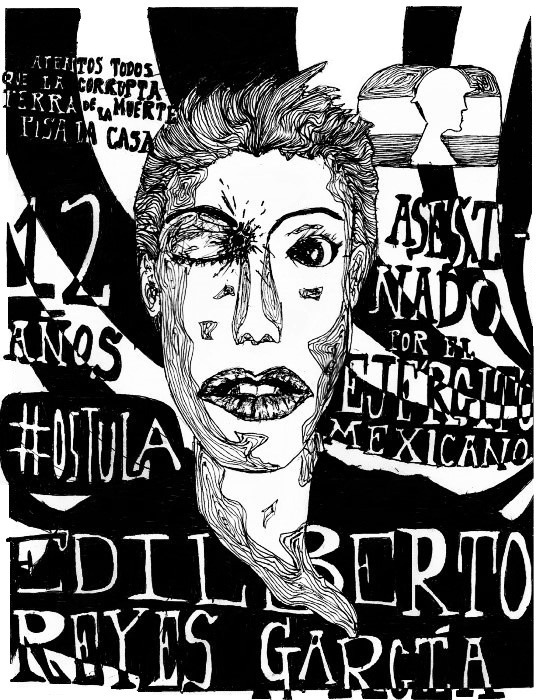
Edilberto Reyes García, asesinado por el Ejército Mexicano el 19 de julio de 2015 en Ostula, Michoacán, a los 12 años de edad.
Los ruiseñores no hacen otra cosa que crear música para que la disfrutemos.[…] no hacen otra cosa que cantar su corazón para nosotros. Es por eso que es un pecado matar a un ruiseñor.
Harper Lee
Edilberto Reyes García in memoriam
Atentos todos que la corrupta perra de la muerte pisa la casa Es el verano pero los deltas llevan fango hasta los huertos y a esta hora de la tarde bien o mal llamémosle silencio
Eran los deltas del verano sí la luz multiplicaba cielos pero llegaron los soldados y te partieron la mirada era la muerte que vomitaba mierda o era la mierda que vomitaba muerte pero no es eso tú llovías en otro atardecer tú llovías en un atardecer futuro y los demás temblábamos tú llovías en sangre y luces estelares y los demás temblábamos y te bebíamos pero no es eso es que llegaron los soldados y te partieron la mirada llegaron escupiendo balas que es otra forma de decir que vomitaban mierda o que la mierda vomitaba muerte la luz multiplicaba cielos atravesaba párpados Pero no es eso Están aquí dijeron No pasarán dijeron Igual fueron valientes pero el verano ya no esculpió su fuego verde quiero decir dejó de tallar luz quiero decir que los soldados te mataron desgarraron su cobardía en tu rostro niñito amado te cegaron la luz en tu carita sin tocar tus ojos un desbaratar de mundo cuando todavía no se sabe qué es poesía
Se es poesía
¿No es esa una razón suficiente para aborrecer al mundo? ¿Para paralizar al mundo? ¿Para llorarte hasta quedar casi vacío?
La ventana de tu frente es el horror que nos devora La forma abyecta de la cruel oscuridad de la consciencia
¿Escudo humano? Atentos todos que la corrupta perra de la muerte pisa la casa No, niñito amado
Se le llama voluntad de ser
Llegaron los militares y se rieron Ametrallaron tu carita y rieron ¿Quién puede ahogar la rabia? Yo quiero ahogar el silencio
No te estrujé en mis brazos No ungí mi rabia en tu crisálida de sangre No mojé tu herida con mi llanto Pero te vi llover en el atardecer de un día futuro nutriendo la lozanía del tiempo delimitando los espacios de la muerte
Y me vi queriéndote
Escrito el 22 de junio de 2015.
Publicado originalmente en OSTULA.
#Adrián Eleuteri#barbarie#ejército#Harper Lee#infancia#Luis Cárdenas López#México#muerte#Ostula#poesía#PRI#Michoacán
2 notes
·
View notes
Text
Traslado de oficinas del IMSS representa la generación de empleos más importante en 50 años: Bedolla
Traslado de oficinas del #IMSS a #Michoacán representa la generación de empleos más importante en 50 años: #Bedolla
Autoridades estatales, municipales y legisladores, así como sector empresarial y educativo participaron en la segunda mesa consultiva para el traslado del IMSS a Michoacán *Morelia, Michoacán, 11 de junio del 2022.-* El traslado de las oficinas centrales del Instituto Mexicano del Seguro Social (IMSS), representará la generación de empleos más importante para Michoacán en los últimos 50 años,…
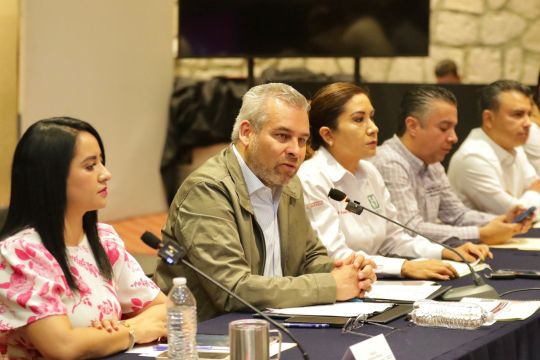
View On WordPress
#Alfonso Martínez Alcazar#Azucena Marín Correa#Bedolla#Canadevi#CEEM#Colegio de notarios#Gladyz Butanda Macías#IMSS#Luis Navarro García#María Luisa Rodea Pimentel#Raúl Cárdenas Navarro#Raymundo López Olvera#Rubén Medina González#UMSNH
0 notes
Photo
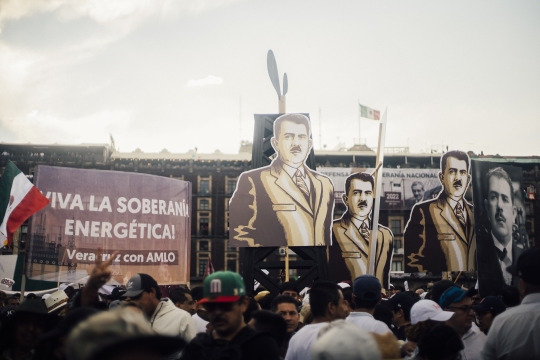
Message from the President of Mexico, Andrés Manuel López Obrador on the 85th anniversary of the expropriation of the country’s oil industry.
Rally held on Saturday, March 18, in Mexico City’s Zócalo square.
PRESIDENT ANDRÉS MANUEL LÓPEZ OBRADOR: Friends:
This is a commemoration of the expropriation of the oil industry and it is a national event. Participating here today are residents of Aguascalientes, Baja California, Baja California Sur, Campeche, Chiapas, Chihuahua, Mexico City, Coahuila, Colima, Durango, State of Mexico, Guanajuato, Guerrero, Hidalgo, Jalisco, Jalisco, Chiapas, Chiapas, Chiapas, Chihuahua, Mexico City, Coahuila, Colima, Durango, State of Mexico, Guanajuato, Guerrero, Hidalgo, Jalisco, Michoacán, Morelos, Nayarit, Nuevo León, Oaxaca, Puebla, Querétaro, Quintana Roo, San Luis Potosí, Sinaloa, Sonora, Tabasco, Tamaulipas, Tlaxcala, Veracruz, Yucatán, and Zacatecas.
Long live Mexico!
Friends:
Unlike Francisco I. Madero, who, in order to realize his beautiful democratic ideal could not or did not consider it indispensable to strengthen his ties with the people, especially with the Zapatista peasants, General Lázaro Cárdenas did not hesitate to rely on those from below to make his transformation a reality.
The general's strategy can be summarized in three important and consecutive actions:
First, he distributed land to the peasant farmers and helped the workers.
Then, he helped them organize.
And, finally, with this social base he was able to carry out the expropriation of the oil industry and other national assets that Porfirio Díaz had handed over to private interests, mainly foreigners.
The top priority of the Cardenista strategy was to attend to the economic and social demands of peasant farmers and workers. The president knew that the only way to gain the backing of the people was to act decisively in favor of their demands. Consequently, from the beginning of his government, a program of land distribution was launched; the peasant farmers mobilized throughout the country requesting that they be given land through the expropriation of large estates or providing them with deeds for state land.
In a short time, the distribution of land to peasant farmers transformed the structure of Mexican agriculture. The revolutionary importance of the Cardenista land distribution policies can be measured with a key piece of data. In the first three years of his administration, 9,764,000 hectares were given to 565,216 peasants, which vastly surpassed the amount of land that had been distributed since the Revolution.
By the end of Cardenas’ administration, 10,651 ejidos (1) had been established, comprising a total of more than 18 million hectares and benefiting more than one million indigenous families, impoverished peasant farmers, and rural day laborers.
The peasants unquestionably saw Cárdenas to be a faithful representative of the revolutionary cause. The agrarian reform ensured the loyalty of many people to the Cardenista government and from that point the alliance between peasant farmers and the State was established.
At the same time, during the Cárdenas years, workers felt that their labor rights were guaranteed. With strict adherence to the law, Cárdenas respected the economic struggle of workers for better wages and working conditions. His measures in this field consisted of making the formal content of Constitutional Article 123 (2) a reality.
From the beginning of his government, the labor movement began engaging in intense activity aimed at winning its demands; it was even able to freely exercise the right to strike.
By the middle of the president’s six-year term in office, peasant farmers and workers identified Cárdenas as the defender of their interests. The first part of Cardenas' strategy had been successful; the President's approach and solidarity with the most vulnerable social groups resulted in the support and adhesion of the majority to the government's policies.
The political organization of workers and peasant farmers as a second link in the Cardenista strategy also developed with intensity and enthusiasm.
First, most of the national industrial unions were established. The Mexican Workers’ Confederation, the CTM, was founded on February 24, 1936. Although the organization's declaration of principles stated, and I quote, that 'the Mexican proletariat will fundamentally fight for the total abolition of the capitalist system,' its leaders accepted the president's proposal and agreed on the need to first achieve the country’s political and economic liberation. In accordance with these principles, the workers' movement resolutely supported the government in its struggle for national sovereignty.
On July 9, 1935, President Cárdenas recommended that the organization of Mexico's peasant farmers take place. With this in mind, the agrarian community leagues were created in all states of the country and their integration with the unions of rural wage earners resulted in the establishment of the National Peasant Confederation, the CNC.
The organization and political mobilization of the masses made it possible to advance in the aim of asserting our country’s economic independence, and thus with the expropriation of the oil companies, national assets and resources that had been in the hands of foreigners since the Porfiriato (3) began to be returned to the nation.
This strategy could not have succeeded without the exceptional qualities of a noble and just man such as General Lázaro Cárdenas del Río.
Politics is not only rationality, but also, like other activities in life, requires mystique and convictions. Political processes are more complex than what rationalist intellectuals assume; political processes also involve factors such as luck, the brilliance of leaders and the sentiments of the people.
General Cárdenas, unlike careerist or elite politicians, professed a sincere and deep love for the people. Just as there is no one with the democratic aspiration of Madero, neither has there ever existed in Mexico a president as close to the downtrodden or as convinced of the cause of social justice as General Cárdenas.
For example, in 1935, when he was already president, already in power, Cárdenas wrote the following in his notes:
'To put an end to the miseries experienced by the people is above all other interests'.
And he maintained: 'Living amid the needs and anguish of the people, one will easily find the way to remedy them'.
Although he also confessed that he had been able to see the true moral background of many public servants. 'When I observe in their faces the disgust sparked by the poor peoples’ demand for assistance or justice, then I think more,' he lamented, 'of the endless tragedy of our own people.’
For young people who want to devote themselves to the noble profession of politics, what is most important is love for the people.
In addition to being a true humanist and possessing other virtues, General Cárdenas knew how to navigate his times with precision. Politics, among other things, is time management, a question that is usually essential and defining.
A few days before announcing the expropriation of the oil industry, he wrote in his notes that, on the highway near Cuernavaca, he’d walked and talked for more than an hour with his teacher, friend and compañero, General Francisco J. Múgica. I’d like to quote General Cárdenas when he says:
'We considered the circumstances that could arise if governments such as those of England and the United States, interested in backing the oil companies, pressured the Mexican government with violent measures. But we also took into account that the threat of a new world war is already present due to the provocations of Nazi-fascist imperialism, and that this would stop them from attacking Mexico in the event that the expropriation was decreed.'
Among other reasons, and taking advantage of this circumstance, on March 18, 1938, the oil industry expropriation was launched. At eight o'clock in the evening, General Cárdenas informed his cabinet of this historic decision and, two hours later, in a radio address to the nation he announced the step taken by the government in defense of Mexico’s sovereignty, returning to the nation the oil wealth that, as the General himself wrote, 'imperialist capital had been utilizing to keep the country humiliated.'
In four articles, the expropriation decree establishes that the following assets would become assets of the nation: machinery, installations and other fixtures and property of the foreign oil companies, for which compensation would be paid in accordance with Article 27 of the Constitution and the corresponding law.
The oil expropriation was supported by the majority of the people. Photos of the time show the presence of predominantly humble people, indigenous men and women, peasant farmers, workers, teachers, employees, and members of the lower middle class.
It was the common people who supported and cooperated with the government to raise the compensation due to the foreign oil companies. How could we forget that so many poor women donated goats and turkeys for this purpose and even got rid of the meager jewelry they owned!
In those days, from the city of Oakland, California, migrant worker Cástulo Prado composed the lyrics and music of the Corrido del Petróleo and sent it to the president with the instruction that the government allocate any royalties from the work to the compensation fund. One of its verses reads as follows:
'Lázaro Cárdenas says, serene and carefree: in the course of 10 years, everything will be paid, I have the Mexican people of which I have no doubt. From the youngest to the oldest, they all offer me their help. In the Mexican woman there is patriotism and pride, she gives up her jewelry to offer them for coins.'
In addition to this massive and overwhelming popular support, the Cárdenas government had another favorable circumstance. At that time Franklin Delano Roosevelt, a great statesman and one of the finest presidents that country has ever had in its history, was governing the United States. Let’s recall that when Roosevelt entered the White House on March 4, 1933, the United States was experiencing one of the worst crises in its history and that, as president, Roosevelt knew how to deal with that crisis successfully and very soon restored hope to his people, which made him one of the greatest politicians of the 20th century.
As for his foreign policy, let’s recall that, in a memorable speech, which is the antecedent of the principles of the UN, on January 6, 1941, Roosevelt laid out four basic freedoms for the world: the right to freedom of speech, the right to freedom of worship, the right to live free from want, and the right to live free from fear.
Roosevelt's presidency applied the ‘good neighbor policy’ with the countries of the Western Hemisphere. At that moment, the principles of economic and political cooperation were defined, the sovereignty of Cuba and Panama was recognized, and the U.S. military withdrawal from Nicaragua and Haiti was ordered. It is not by chance that the great poet Pablo Neruda called Roosevelt a titan of the struggles for freedoms, a tremendous president.
The authenticity of his good neighbor policy was most clearly demonstrated in the respect for the sovereignty of our country. During Roosevelt's three presidential terms, relations between Mexico and the United States were exceptionally good.
In the days following the oil industry expropriation, General Cárdenas acknowledged Roosevelt’s role in a letter:
'My government’ -wrote the general- ‘feels that the attitude assumed by the United States of America, in the case of the expropriation of the oil companies, once again affirms the sovereignty of the peoples of this hemisphere that the statesman of the most powerful country in the Americas, the most esteemed President Roosevelt, has been supporting with such effort'.
Cástulo Prado, the poet we have already quoted, a people’s poet, also left testimony of the upright attitude, the grandeur, and the respect shown by the president of the neighboring country. Cástulo's verses read:
'The millionaires asked for intervention. They went to the United States to lodge their complaint -it looks to us, it looks to us, it looks to us- they went to the United States to lodge their complaint so that from there they would move to protect their companies. Roosevelt told them: 'Gentlemen, I can do nothing about it, the Mexican government has fulfilled its duty.'
The good results of this policy had much to do with the U.S. Ambassador to Mexico, Joseph Daniels, who acted with wisdom and skill in the most difficult years of relations between the two countries. His position on the oil conflict is summarized when he maintained that President Cárdenas was right in promoting the policy that the wealth of the subsoil should become part of the Mexican economy and that the oil crisis was due to the systematic refusal of foreign companies to modify their vision, since, Daniels pointed out, they felt that Mexicans were born to enrich foreigners and that God placed important natural resources in Mexico to increase the fortunes found in the coffers of the exploiters and concession holders.
But the companies were not as conscientious and respectful as U.S. politicians. The nationalization process had to confront the boycott, pressures, and acts of sabotage promoted and financed by the foreign oil companies.
In Mexico, the oil industry expropriation caused deep uneasiness among a minority, especially among the wealthy of the time, in middle-class sectors, and in most of the media.
It is interesting, and this is a lesson, to point out that historically the right wing always regroups when a democratic change is sought and becomes intolerant and even violent when it comes to social demands in favor of the people and the nation asserting its control.
Let us remember that the overthrow of President Madero, our Apostle of Democracy, was backed by the intervention of the U.S. Ambassador, but was carried out by domestic right-wing groups which had previously promoted a campaign of hate and discredit consisting of ridiculing the President, President Madero, in the newspapers to the point of treating him as a madman and a spiritualist.
The same thing happened when the expropriation, although it did not directly affect national private interests, served to bring together all the discontent of conservative groups opposed to the agrarian, labor, and educational policies of General Cárdenas.
In this climate, on September 17, 1939, the National Action Party was founded. It was founded as a reaction to the oil industry expropriation. I say this here in the Zócalo because I am not lying, I am speaking the truth.
In 1940, all these reactionary trends manifested themselves very strongly in the presidential election. The right-wing opposition was such that General Cárdenas had to act cautiously, and possibly that influenced him to support the candidacy of Manuel Ávila Camacho and not that of General Francisco J. Múgica, with whom he had more ideological affinity and who represented a greater certainty of continuity and deepening of the social and nationalist policy.
It has always been said that the general did not choose Múgica because of the risk of foreign intervention. However, as we have seen, at that time Roosevelt, who had demonstrated his respect for national sovereignty, was governing and World War II was about to break out, a situation that contributed to dissipating the threat of a U.S. intervention.
In my opinion, what most influenced the decision was the internal political circumstances, that is, the belligerence of the right-wing groups. Remember that, even though he’d decided in favor of the candidacy of Manuel Avila Camacho, who held moderate positions, the presidential election was complicated and violent.
The opposition candidate, Juan Andreu Almazán, had the support of important right-wing groups and a sector of the Army. Even the PAN, which did not run a candidate for the presidency, openly supported him.
At the end of the day, 30 dead and 127 wounded were reported. However, shortly after, Almazán gave in and his supporters, businessmen and right-wing politicians came to an understanding and made a pact for concessions and benefits with the new Ávila Camacho administration.
From then on, the authentic revolutionary ideal and actions for the benefit of the people began to be abandoned, although it must be acknowledged that this alliance between political and economic power perhaps avoided civil war and maintained social peace.
If under Porfirio Díaz, the peace of the graveyard prevailed, after President Cárdenas’ government, the peace of compromises and corruption was established.
In this brief history there are major lessons, the main one being that only with the people, only with the support of the majority, can a popular transformation be carried out to enforce justice and confront the reactionaries who oppose the loss of privileges.
For this reason, today we once again declare, we exclaim from the rooftops: no zigzagging, let us remain anchored in our principles, let us reaffirm the decision and the course we have taken since the administration began. No half measures: we in Mexico will never allow a minority to impose itself at the expense of the humiliation and impoverishment of the majority.
That is why, in our government, corruption is being fought. There is an austere government, without luxuries, and all the savings are used to finance well-being programs, such as pensions for the elderly, support for people with disabilities, single mothers, peasant farmers and fishermen, scholarships for students from poor families, Internet for All, housing improvement and construction programs, collateral-free loans, fertilizer, and guaranteed prices for the country's small producers, the Bank of Well-Being, the promotion of education and universal and free public health care.
This year more than 25 million people will receive direct support totaling 600 billion pesos (4). In other words, out of 35 million households in the country, 71 percent will receive the benefits of at least one of the social programs.
With this policy of attention to the neediest, the most vulnerable, and especially to young people, we have also been able to reduce federal crimes by 33 percent, homicides by 10 percent, vehicle theft by 38 percent, general robberies by 20 percent, huachicol (5) by 92 percent, femicides by 28 percent, and kidnappings by 76 percent.
By the same token, the savings from not allowing corruption or budgetary waste have enabled us to avoid contracting more debt. We have not requested additional debt since we have been in office.
And at the same time, without increasing the public debt in real terms, taxes have not been increased, the price of gasoline, diesel, gas, and electricity have not risen. There has even been a decrease in the price of these energy resources.
There has also been an increase in public investment, as has not occurred in many years. This year we will spend more than one trillion pesos (6) on public work projects. That is, we will continue building highways, bridges, trains, airports, hospitals, universities, markets, sports facilities, seawalls, and natural, recreational, and ecological parks.
And we are carrying out something very important: an extensive project to recover and restore historical and archeological sites of our ancient and splendid cultures and civilizations.
Public finances are strong, the national economy is booming. Last year the Mexican economy grew even more than the economies of China and the United States.
There are an unprecedented 21,747,000 workers enrolled in the health system. This figure of 21,747,000 workers in the formal economy has never been reached before.
In addition, an average wage of 525 pesos (7) per day has been achieved for these workers in the formal economy, something that had never occurred before.
The unemployment rate last January was 2.9 percent, the lowest since 2005.
We are carrying out public work projects. Right here we are refurbishing the Metro line that collapsed.
We are, of course, building the Toluca-Mexico City train line, the Maya Train, the Transisthmic Train and many, many other public works projects.
What is happening?
After many years, we managed to get the United States to offer temporary work visas. Canada was already doing this and the United States did not accept it. Now with President Biden’s change of policy it was achieved, but they are taking skilled workers, ironworkers, welders, who are needed here for the works projects. We are going to make a small modification, because Mexico comes first and then foreign countries, but this shows how much demand there is for jobs in the country.
During the time we have been in office, the minimum wage has increased by 90 percent in real terms, and on the border it has more than doubled.
Do you remember what the lying technocrats used to say? That if wages were increased, there would be inflation. That's all a bunch of nonsense. That is not true. Of course, we have to improve wages responsibly, to strengthen the domestic market, as we are doing, and thus achieve well-being for our people.
The stock market, corporate and bank profits are posting good numbers.
The Banco de México’s reserves have increased by 15 percent, 200 billion dollars in bank reserves.
Foreign investment has climbed to previously unseen figures.
This has also occurred with remittances from our migrant countrymen and women. Thank you very much, fellow countrymen and women. Last year these remittances practically reached 60 billion dollars; this year they are going to exceed 60 billion dollars.
This is very important, because this money gets to the most remote communities, to 10 million families who benefit from them, and with this money the regional economy, commerce and other economic activities are reactivated.
It is also important to emphasize that the peso is the currency that has most appreciated in the world in relation to the dollar, something that has not occurred for more than 50 years.
We have also directed our resources and efforts to achieve food self-sufficiency and energy self-sufficiency. In the latter, as reported here by the Ministry of Energy and the Director of Pemex, we can be certain that oil sovereignty is being guaranteed. Next year we will not be buying gasoline, diesel or other oil products abroad; we will be processing all of our raw materials.
The Federal Electricity Commission, the public company in charge of managing the electricity industry, has been strengthened.
And recently lithium, a strategic mineral used in manufacturing batteries for electric cars and storage systems for clean energy, was nationalized.
It fills me with pride to be able to recall -I apologize for taking so long, but I am about to finish- it fills me with pride to be able to recall today, March 18, that, despite the policy of granting concessions that prevailed before we came into office, we were able to remove a long chapter from the Free Trade Agreement that compromised our oil and put in its place a small paragraph, which I am going to read to you.
It says: 'The United States and Canada recognize that Mexico reserves its sovereign right to reform its Constitution and domestic legislation, and Mexico has the direct, inalienable, and imprescriptible ownership of all hydrocarbons in the subsoil of the national territory.'
My friends:
I am convinced that we will continue to receive the support of the people to consolidate the first stage in the transformation of our country.
I am also convinced that whichever candidate wins the poll to become the candidate of our movement will apply the same policy in favor of the people and in favor of the nation.
Continuity with change is assured. There is nothing to fear. Of course, we have to remain united, always looking towards the future and the happiness of our fellow men and women. This means working from below and with the people, and without neglecting the strategy that we rightly call the revolution of consciences to keep advancing in the change of mentality so as to continue politicizing our people and thus have an increasingly aware population. In this we have made considerable progress, as Mexico is one of the countries with the least political illiteracy in the world.
With that awareness we will continue, with that collective consciousness we will continue to counteract the dirty war, the slander campaigns and the attempts at manipulation that will continue to be waged, because our adversaries and their media, sold out, rented or in the hands of the members of the conservative and corrupt block, have no other choice. But at the same time we must have faith in the wisdom and loyalty of the people, the people do not betray.
Let’s recall that the victory of the reactionaries, as Juarez said, is morally impossible. We are finding that the idea and practice of exalting Mexican humanism is electrifying and is reaching the consciousness of millions of people. I base my optimism on this.
And even though it is more dangerous to underestimate the strength of one’s adversaries than to overestimate it in politics, I maintain that no matter what they do, the oligarchs will not return to power; an authentic and true democracy will continue to prevail in our beloved Mexico.
Friends:
I cannot fail to mention that in the past few days some U.S. legislators, accustomed to seeing the mote in their brother's eye, but not seeing the beam in their own, in a propaganda ploy -we would say here in colloquial language grilla or intrigue- and for electoral, politicking purposes, argued that, if we did not stop the trafficking of fentanyl to the northern border, that they were going to propose to the Congress of their country that U.S. soldiers occupy our territory to confront organized crime.
First, I want to make it clear that this is no longer the time of Calderón or García Luna, that this is no longer the time of shady links between the Mexican government and U.S. government agencies. Now there is no simulation, organized and white-collar crime is truly being fought, because there is no corruption, no impunity, and there are no complicit relationships with anyone.
But what is most important is that from here, from this Zócalo square, the political and cultural heart of Mexico, we remind those hypocritical and irresponsible politicians that Mexico is an independent and free country, not a colony or a protectorate of the United States, and that they can threaten to perpetrate any offense, but we will never, ever allow them to violate our sovereignty and trample on the dignity of our homeland.
Cooperation yes, submission no; interventionism no.
PRESIDENT ANDRÉS MANUEL LÓPEZ OBRADOR: Oligarchy!
Crowd response: No!
PRESIDENT ANDRÉS MANUEL LÓPEZ OBRADOR: Corruption!
Crowd response: No!
PRESIDENT ANDRÉS MANUEL LÓPEZ OBRADOR: Racism!
Crowd response: No!
PRESIDENT ANDRÉS MANUEL LÓPEZ OBRADOR: Freedom!
Crowd response: Yes!
PRESIDENT ANDRÉS MANUEL LÓPEZ OBRADOR: Democracy!
Crowd response: Yes!
PRESIDENT ANDRÉS MANUEL LÓPEZ OBRADOR: Honesty!
Crowd response: Yes!
PRESIDENT ANDRÉS MANUEL LÓPEZ OBRADOR: Social justice!
Crowd response: Yes!
PRESIDENT ANDRÉS MANUEL LÓPEZ OBRADOR: Equality!
Crowd response: Yes!
PRESIDENT ANDRÉS MANUEL LÓPEZ OBRADOR: Sovereignty!
Crowd response: Yes!
PRESIDENT ANDRÉS MANUEL LÓPEZ OBRADOR: Long live the expropriation of the oil industry!
Crowd response: Viva!
PRESIDENT ANDRÉS MANUEL LÓPEZ OBRADOR: Long live the workers and technicians of the national oil industry of yesterday and today!
Crowd response: Viva!
PRESIDENT ANDRÉS MANUEL LÓPEZ OBRADOR: Long live General Lázaro Cárdenas del Río!
Crowd response: Viva!
PRESIDENT ANDRÉS MANUEL LÓPEZ OBRADOR: Viva Mexico!
Crowd response: Viva!
PRESIDENT ANDRÉS MANUEL LÓPEZ OBRADOR: Viva México!
Crowd response: Viva!
PRESIDENT ANDRÉS MANUEL LÓPEZ OBRADOR: Viva México!
Crowd response: Viva!
Translator’s Notes:
1) Ejidos – semi-communal farmland
2) Constitutional Article 123 enshrines labor rights
3) Porfiriato - The period of Porfirio Díaz's presidency of Mexico (1876–80; 1884–1911), an era of dictatorial rule
4) US$31.89 billion
5) Huachicol – the massive theft of fuel from pipelines and refineries
6) US$53.16 billion
7) US$27.91
Translated by Pedro Gellert
México City, March 18, 2023
26 notes
·
View notes
Text
Antología de narrativa contemporánea.
Compilación - 52 autores (2006-2023)
Descarga desde Telegram
Descarga desde Google Drive
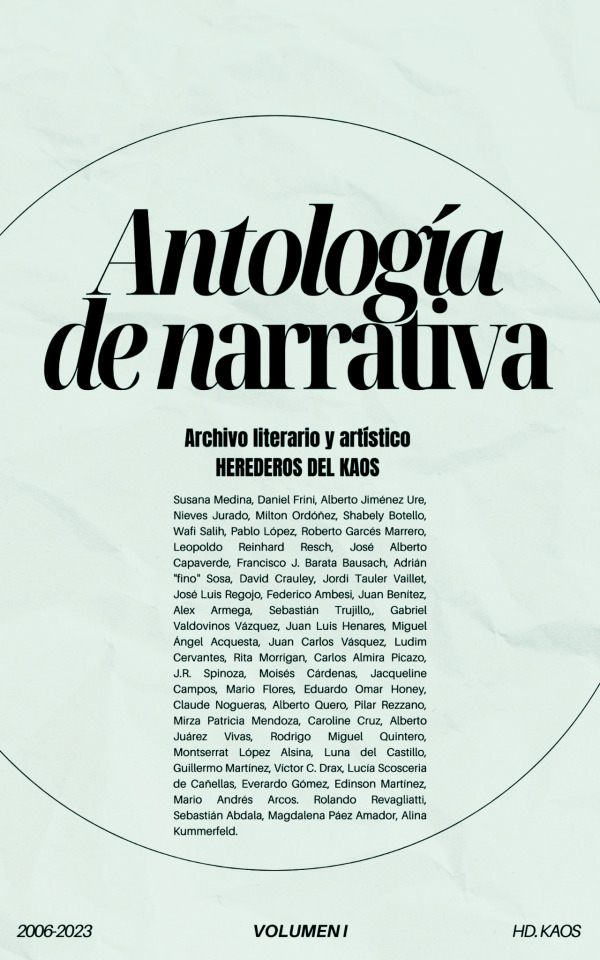
*Apps requeridas para acceder: Telegram o Google Drive, y "Lithium: lector ePub". Todos los archivos disponibles en formato (EPUB) en Herederos del Kaos (canal telegram).
©Autores: Daniel Frini, Alberto Jiménez Ure, Nieves Jurado, Milton Ordóñez, Shabely Botello, Wafi Salih, Pablo López, Roberto Garcés Marrero, Leopoldo Reinhard Resch, José Alberto Capaverde, Francisco J. Barata Bausach, Susana Medina, Adrián "fino" Sosa, David Crauley, Jordi Tauler Vaillet, José Luis Regojo, Federico Ambesi, Juan Benítez, Alex Armega, Sebastián Trujillo,, Gabriel Valdovinos Vázquez, Juan Luis Henares, Miguel Ángel Acquesta, Juan Carlos Vásquez, Ludim Cervantes, Rita Morrigan, Carlos Almira Picazo, J.R. Spinoza, Moisés Cárdenas, Jacqueline Campos, Mario Flores, Eduardo Omar Honey, Claude Nogueras, Alberto Quero, Pilar Rezzano, Mirza Patricia Mendoza, Caroline Cruz, Alberto Juárez Vivas, Rodrigo Miguel Quintero, Montserrat López Alsina, Luna del Castillo, Guillermo Martínez, Víctor C. Drax, Lucía Scosceria de Cañellas, Everardo Gómez, Edinson Martínez, Mario Andrés Arcos, Rolando Revagliatti, Sebastián Abdala, Alina Kummerfeldt, Magdalena Páez Amador.
©Antología de narrativa contemporánea es una publicación sin fines de lucro. Su distribución a través de terceros es completamente libre, siempre y cuando no se haga un uso comercial del libro y se citen correctamente sus fuentes."
***
#literatura#cultura#antología#libros gratis#librosepub#libros digitales#herederos del kaos#narrativa contemporanea#cuento#relatos#narrativa
0 notes
Photo
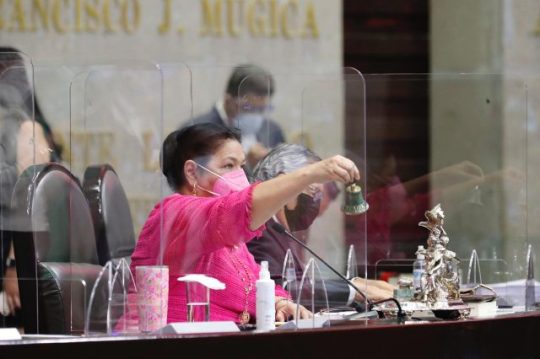
New Post has been published on https://notimundo.com.mx/politica/mesa-directiva-dio-cuenta-de-oficios-de-diputadas-y-diputados/
Mesa Directiva dio cuenta de oficios de diputadas y diputados.

Mesa Directiva dio cuenta de oficios de diputadas y diputados que participarán en elección consecutiva.
La diputada Sauri Riancho dijo que en términos del último párrafo del sexto resolutivo del “Acuerdo de los órganos de gobierno de la Cámara de Diputados, por el que se establecen disposiciones internas aplicables a diputadas y diputados federales que opten por la elección consecutiva en el proceso electoral 2020-2021”, manifiestan su voluntad de renunciar a los apoyos económicos a los que tienen derecho.
Enseguida, pidió a la secretaría de la Mesa Directiva dar lectura a los nombres de las diputadas y los diputados.
Por MC, Mario Alberto Rodríguez Carrillo y Juan Martín Espinoza Cárdenas.
Del PVEM, Leticia Mariana Gómez Ordaz, Lilia Villafuerte Zavala y Roberto Antonio Rubio Montejo.
De Encuentro Social, Manuel de Jesús Baldenebro Arredondo, Irma María Terán Villalobos, Jorge Arturo Argüelles Victorero, Esmeralda de los Ángeles Moreno Medina, Leticia Arlett Aguilar Molina y Nancy Claudia Reséndiz Hernández.
Por Acción Nacional, Justino Eugenio Arriaga Rojas, Juan Carlos Romero Hicks, Luis Alberto Mendoza Acevedo, Karen Michel González Márquez, José Salvador Rosas Quintanilla, Gloria Romero León y Patricia Terrazas Baca.
Del PRI, Alfredo Villegas Arreola, Frinné Azuara Yarzábal, Brasil Alberto Acosta Peña, Cynthia Iliana López Castro, Pablo Guillermo Angulo Briceño, Laura Barrera Fortoul, Ricardo Aguilar Castillo, María Ester Alonzo Morales e Ismael Alfredo Hernández Deras.
Por el PT, Ana Karina Rojo Pimentel, María de Jesús Rosete Sánchez, José Gerardo Rodolfo Fernández Noroña, Francisco Favela Peñuñuri, Alfredo Porras Domínguez, Claudia Angélica Domínguez Vázquez, Margarita García García, Luis Enrique Martínez Ventura, Jesús Fernando García Hernández, Alfredo Femat Bañuelos, Clementina Marta Dekker Gómez, Óscar González Yáñez y Dionicia Vázquez García.
También, José Luis Montalvo Luna, Elba Lorena Torres Díaz, María Teresa Marú Mejía, José Luis García Duque, Francisco Javier Huacus Esquivel, Armando Reyes Ledesma, Santiago González Soto, Olga Juliana Elizondo Guerra, Maribel Martínez Ruiz, Ángel Benjamín Robles Montoya, Hildelisa González Morales, Ana Laura Bernal Camarena, Mauricio Alonso Toledo Gutiérrez y Nelly Maceda Carrera.
Por Morena, Heriberto Marcelo Aguilar Castillo, Maribel Aguilera Cháirez, Aleida Alavez Ruiz, María Isabel Alfaro Morales, Karla Yuritzi Almazán Burgos, Guillermina Alvarado Moreno, José Guadalupe Ambrocio Gachuz, Socorro Irma Andazola Gómez, Carol Antonio Altamirano, Reyna Celeste Ascencio Ortega, María del Carmen Bautista Peláez, Rosa María Bayardo Cabrera, Francisco Javier Borrego Adame, Wendy Briceño Zuloaga, Susana Cano González, Olegaria Carrazco Macías, Alejandro Carvajal Hidalgo, Katia Alejandra Castillo Lozano, María Chávez Pérez, Miguel Ángel Chico Herrera, Gustavo Contreras Montes y Flora Tania Cruz Santos.
Asimismo, Diego Eduardo del Bosque Villarreal, Rosalinda Domínguez Flores, Roberto Ángel Domínguez Rodríguez, José Luis Elorza Flores, Brenda Espinoza López, María Bertha Espinoza Segura, Melba Farías Zambrano, Lidia García Anaya, Martha Olivia García Vidaña, Pablo Gómez Álvarez, Sandra Paola González Castañeda, Erasmo González Robledo, Juanita Guerra Mena, Yolanda Guerrero Barrera, Óscar Eugenio Gutiérrez Camacho, Daniel Gutiérrez Gutiérrez, Sergio Carlos Gutiérrez Luna, César Agustín Hernández Pérez, María Eugenia Hernández Pérez, Arturo Roberto Hernández Tapia, Rafael Hernández Villalpando, Javier Hidalgo Ponce, Benjamín Saúl Huerta Corona y María de los Ángeles Huerta del Río.
También, Miguel Pável Jarero Velázquez, Irma Juan Carlos, Claudia López Rayón, Adriana Lozano Rodríguez, Mirna Zabeida Maldonado Tapia, Sergio Mayer Breton, Jorge Luis Montes Nieves, Carmen Mora García, Alma Delia Navarrete Rivera, Manuela del Carmen Obrador Narváez, Aracely Ocampo Manzanares, Sandra Simey Olvera Bautista, Alejandra Pani Barragán, Inés Parra Juárez, Jaime Humberto Pérez Bernabe, Beatriz Dominga Pérez López, Laura Imelda Pérez Segura, Miguel Ángel Prado de los Santos, Verónica Ramos Cruz, Guadalupe Ramos Sotelo y Valentín Reyes López.
Además, Fortunato Rivera Castillo, Beatriz Robles Gutiérrez, Martha Robles Ortiz, Manuel Rodríguez González, Ana María Rodríguez Ruiz, María Guadalupe Román Ávila, Carlos Sánchez Barrios, Graciela Sánchez Ortiz, Juan Pablo Sánchez Rodríguez, Azael Santiago Chepi, Yadira Santiago Marcos, Claudia Tello Espinoza, Rosalba Valencia Cruz, Lorenia Iveth Valles Sampedro, Víctor Gabriel Varela López, Teresita de Jesús Vargas Meraz, Julieta Kristal Vences Valencia, Alberto Villa Villegas y Silvia Lorena Villavicencio Ayala.
También, Dulce María Corina Villegas Guarneros, Casimiro Zamora Valdez, Erika Vanessa del Castillo Ibarra, Evaristo Lenin Pérez Rivera, Paola Tenorio Adame, Emmanuel Reyes Carmona, Irán Santiago Manuel, Nayeli Salvatori Bojalil, Vicente Alberto Onofre Vázquez, Francisco Elizondo Garrido, Ulises Murguía Soto, Laura Mónica Guerra Navarro, Nayeli Arlen Fernández Cruz, Moisés Ignacio Mier Velazco y Alfonso Ramírez Cuéllar.
Conforme a dichos oficios, renuncian al apoyo económico correspondiente a asistencia legislativa, atención ciudadana, transporte y hospedaje y al informe de actividades legislativas, por el periodo que comprende del 1 de abril al 15 de junio del año en curso.
2 notes
·
View notes
Text

EN TRIUNAGULAR AMISTOSO
Cancún, Quintana Roo., 22 de diciembre de 2024.-Bravos vence a Venados FC y empata frente a Cancún FC
Los Bravos de Juárez consiguieron un triunfo sobre Venados FC y un empate frente al Cancún FC en un triangular amistoso que se desarrolló la tarde de este domingo en el Estadio Andrés Quintana Roo.
El conjunto juarense enfrentó primero al Cancún y el duelo terminó con marcador de 1-1. El gol de los Bravos fue anotado por Jan Carmona al minuto 50 del partido.
En el segundo partido los Bravos enfrentaron a Venados y terminaron con marcador a favor de 1-2. Los dos goles del equipo fronterizo los anotó Diego Valoyes, al minuto 3 y al 4, en un buen arranque de partido para los dirigidos por Martín Varini.
En cada partido se disputaron dos tiempos de 30 minutos. Jairo Torres no tuvo participación en estos duelos debido a molestias musculares.
Con esto termina el viaje de pretemporada de los Bravos a Cancún, Quintana Roo, donde se trabajó durante siete días a nivel del mar.
El Equipo de la Frontera continuará su pretemporada en Ciudad Juárez la siguiente semana para afinar detalles con miras a su debut en el Clausura 2025.
ALINEACIÓN VS CANCÚN FC: Benny Díaz (P) Javier Nevarez José Manríquez Haret Ortega Eder López Jonathan González César Sosa Jan Carmona Alex Méndez Karel Campos Ángel Zaldívar
CAMBIOS: Arturo Delgado (Benny Díaz) Daniel Cárdenas (Eder López)
ALINEACIÓN VS VENADOS FC: Sebastián Jurado (P) Diego Campillo Moisés Mosquera Carlos Salcedo Ralph Orquin Denzell García Guilherme Castilho Diego Valoyes José Luis Rodríguez Dieter Villalpando Óscar Estupiñán
CAMBIOS: Eder López (Ralph Orquin)
(Prensa FC Juárez)
0 notes
Text
Abelina y Yoshio, únicos contendientes reales por la presidencia de Acapulco | Bulmaro Cabrera
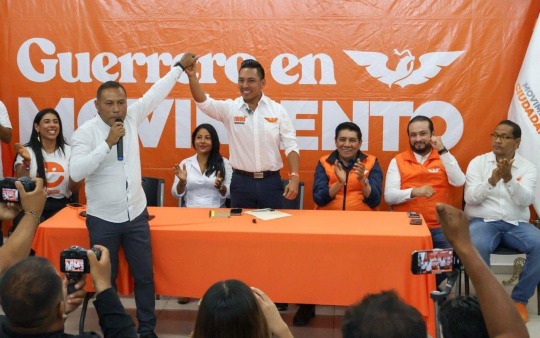
ACAPULCO, Gro. * Mayo 15, 2024. ) Acapulco Press Tras soslayar el llamado del priísta Socorro Sofío Ramírez Hernández al candidato de Movimiento Ciudadano, Yoshio Ávila González, para que decline a favor del contendiente de la alianza PRI/PAN/PRD, Carlos Granda Castro, Bulmaro Cabrera Rojas, ex perredista vinculado a Jesús Evodio Velázquez Aguirre, y Luis Amed Salas Justo, ex priísta ligado a Manuel Añorve, adujeron, con sorna, que el llamado de Sofío no es más que un remedo de lo hecho por su dirigente nacional, Alejandro Moreno Cárdenas, "por la nula respuesta de la sociedad acapulqueña en sus famélicos recorridos". Acto seguido, señalaron que la competencia electoral en Acapulco es solamente entre Abelina López, candidata de Morena, y Yoshio Ávila. Nadie más. Y demeritando el trabajo titánico que ha hecho el 'Brother' Ramiro Solorio Almazán, aspirante del PES a la alcaldía de Acapulco, quien hasta ahora ha sido el único candidato que a presentado proyectos reales sobre "seguridad, agua potable, turismo, bienestar animal, medio ambiente y DIF", el expriísta Salas Justo dijo que el 'pesista' se tendría que conformar con el tercer lugar en la elección del 2 de junio próximo, pues seguramente desplazaría al Granda porque estos carecen de propuestas. "Yoshio Ávila encabeza el único proyecto que representa un riesgo contra del gobierno en turno", subrayó el experredista Cabrera. "El próximo 2 de junio (Yoshio) le va a poner punto final a los seis últimos años de malos gobiernos de Abelina López y Adela Román Ocampo", advirtió. ) acapulcopress.com Read the full article
#AdelaRománOcampo#BulmaroCabreraRojas#JesúsEvodioVelázquezAguirre#LuisAmedSalasJusto#RamiroSolorioAlmazán#SocorroSofíoRamírezHernández#YoshioÁvilaGonzález
0 notes